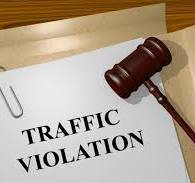Navigating Administrative Sanctions: How Traffic Ticket Lawyers Assist Clients with Vehicle Impoundment and License Plate Confiscation
Traffic Ticket Lawyers
Resolving issues related to vehicle impoundment,
license plate confiscation, or other administrative sanctions resulting from
traffic violations can be complex and daunting for individuals. Traffic ticket
lawyers play a crucial role in assisting clients facing these challenges,
advocating on their behalf to mitigate consequences and restore their driving
privileges. This article explores the various administrative sanctions imposed
for traffic violations and the strategies employed by lawyers to help clients
navigate these issues effectively.
Understanding Administrative Sanctions
Vehicle Impoundment: Vehicle impoundment involves
the temporary confiscation of a driver's vehicle by law enforcement agencies
due to certain nyc traffic ticket lawyer violations. Common reasons for
vehicle impoundment include driving under the influence (DUI), driving without
a valid license or insurance, or reckless driving.
License Plate Confiscation:
License plate
confiscation occurs when authorities seize a driver's license plates due to
violations such as unpaid fines, driving with a suspended license, or repeated
traffic offenses. This sanction prevents the driver from legally operating the
vehicle until the issue is resolved.
Other Administrative Sanctions:
In addition to
impoundment and license plate confiscation, other administrative sanctions may
include driver's license suspension or revocation, fines, mandatory traffic
school, and probation. These penalties aim to deter unsafe driving behavior and
ensure compliance with traffic laws.
Role of Traffic Ticket Lawyers
Traffic ticket lawyers play a critical role in
assisting clients facing administrative sanctions resulting from traffic
violations. Here's how they help:
Legal Representation:
Lawyers provide legal
representation to clients facing administrative sanctions, advocating on their
behalf in administrative hearings or court proceedings. They review the
circumstances of the traffic violation and develop a defense strategy to
challenge the imposition of sanctions or negotiate favorable outcomes.
Understanding Legal Rights:
Lawyers educate
clients about their legal rights and the administrative process involved in
resolving issues related to vehicle impoundment, license plate confiscation, or
other sanctions. They explain the potential consequences of the violations and
the available options for resolving the issues.
Negotiation and Settlement:
Cdl traffic ticket lawyer negotiate with law enforcement
agencies, prosecutors, or administrative authorities to reach settlements or
agreements that mitigate the severity of the sanctions. This may involve
negotiating reduced fines, shortened impoundment periods, or reinstatement of
driving privileges.
Legal Appeals:
In cases where administrative
sanctions are unjust or disproportionate, lawyers may file legal appeals to
challenge the sanctions in court. They present evidence and arguments to
demonstrate errors or inconsistencies in the administrative process and seek
relief for their clients.
Strategies Employed by Traffic Ticket Lawyers
Evidence Gathering: Lawyers conduct thorough
investigations to gather evidence supporting their clients' cases. This may
include reviewing police reports, witness statements, surveillance footage, and
other relevant documentation to identify any discrepancies or weaknesses in the
prosecution's case.

Expert Testimony: Lawyers may enlist the testimony
of expert witnesses, such as accident reconstruction specialists or forensic
analysts, to provide expert opinions on the circumstances of the traffic
violation. Expert testimony can help refute allegations and strengthen the
client's defense.
Mitigation Arguments:
Traffic ticket lawyer near me present mitigation arguments to administrative authorities or
prosecutors, emphasizing factors such as the client's clean driving record,
cooperation with law enforcement, or extenuating circumstances surrounding the
violation. Mitigation arguments aim to persuade authorities to impose lenient
sanctions or dismiss the charges altogether.
Negotiation Skills: Lawyers leverage their
negotiation skills to engage in productive discussions with opposing parties
and reach mutually acceptable resolutions. They advocate for their clients'
interests while seeking to avoid lengthy legal proceedings or harsh sanctions.
Leveraging Legal Knowledge and Experience
Legal Expertise: Traffic ticket lawyers possess
in-depth knowledge of traffic laws, administrative regulations, and legal
procedures governing administrative sanctions. They leverage this expertise to
craft effective legal arguments and navigate the complexities of the
administrative process.
Case Precedents: Lawyers draw upon past case
precedents and legal precedents to support their arguments and establish
favorable outcomes for their clients. They cite relevant legal rulings and
precedents to bolster their defense strategies and challenge the validity of
the sanctions.
Client Advocacy:
Above all, traffic ticket lawyer advocate passionately for their clients' interests, working tirelessly
to achieve the best possible outcomes in their cases. They serve as trusted
advisors and allies, guiding clients through the legal process and providing
reassurance and support during challenging times.
Conclusion
Resolving issues related to vehicle impoundment,
license plate confiscation, or other administrative sanctions resulting from
traffic violations requires skilled legal representation and advocacy. Traffic
ticket lawyers play a vital role in assisting clients facing these challenges,
leveraging their legal knowledge, negotiation skills, and experience to
navigate the complexities of the administrative process effectively. By
providing personalized legal representation, advocating for clients' rights,
and pursuing favorable outcomes, traffic
ticket lawyers help clients restore their driving privileges and move
forward with confidence. Through their diligent efforts, traffic ticket lawyers
uphold the principles of justice, fairness, and accountability in the realm of
traffic law enforcement.
Comments